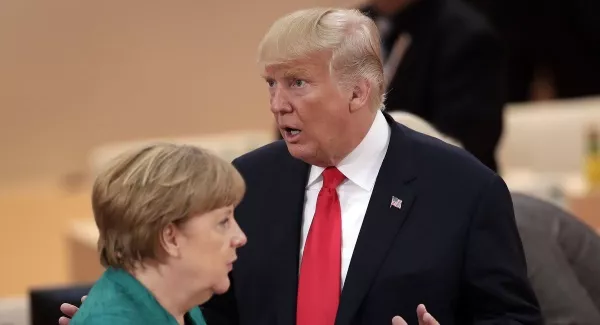By David Shepardson
Germany has said it hopes the EU’s reaction to US trade tariffs will bring sense to all those involved and that a negotiated solution will be sought.
“We want free and open markets,” said a spokesperson for Germany’s economy ministry, adding: “We hope that this clear reaction from the EU will lead to sense and objectivity on all sides and then that solutions can be sought in talks.”

The European Commission’s plan to start charging import duties of 25% on a range of US products — after Washington imposed tariffs on EU steel and aluminium at the start of June — kicked in yesterday.
A spokesperson for UK prime minister Theresa May called the EU moves a “measured and proportionate” response and said Britain supported them but wanted to avoid a continued “tit-for-tat escalation”.
However, President Trump retaliated, yesterday, by threatening to escalate the trade war with Europe by imposing a 20% tariff on all US imports of EU-assembled cars, a month after his administration launched an investigation into whether auto imports pose a national security threat.
“If these tariffs and barriers are not soon broken down and removed, we will be placing a 20% tariff on all of their cars coming into the US. Build them here!,” he tweeted.
The US currently imposes a 2.5% tariff on imported passenger cars from the EU and a 25% tariff on imported pickup trucks. The EU imposes a 10% tariff on imported US cars.
The European Autos Stocks Index fell sharply after Mr Trump’s tweet and shares of US carmakers Ford and General Motors fell immediately before rebounding. European car shares - including Volkswagen, BMW and Mercedes-Benz owner Daimler all fell.
Tariffs on car imports would add to an array of trade wars Mr Trump has started, saying he aims to create US jobs and protect domestic industries.
Mr Trump has threatened duties on up to $450bn of imports from China. Administration officials have said China should strengthen protections for US companies’ intellectual property, and reduce tariffs on US products.
His trade policies have also escalated conflict with Canada and Mexico as he seeks to renegotiate the $1.1 trillion North American Free Trade Agreement on terms more favourable to Washington.
Meanwhile, a new survey shows that eurozone economic growth likely put in a decent performance in the second quarter with private businesses growing faster than expected in June, but trade worries knocked manufacturing growth to the weakest in 18 months.
“Manufacturing is looking especially prone to a further slowdown in coming months, with companies citing trade worries and political uncertainty as their biggest concerns.
“Sentiment about the year ahead in the factory sector has sunk to its lowest since 2015,” said Chris Williamson, chief business economist at IHS Markit.
President Trump’s latest threats on tariffs have exacerbated already elevated tensions over trade, including with the EU.
Trade barriers now being put up could soon push central banks to cut their growth projections.
ECB chief Mario Draghi sounded a note of concern at its annual gathering this week in Sintra, Portugal.
Reuters






